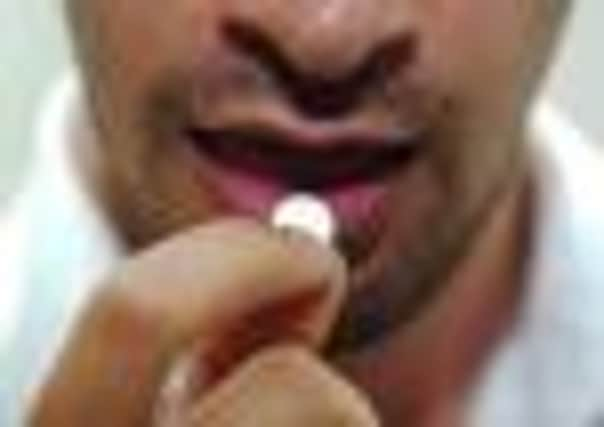Friend or foe? Weighing up the risks of a daily aspirin


Cheap and easy to produce, researchers could hardly believe their luck when they discovered that as well as curing headaches, the little white pill could also reduce the risk of heart attacks and strokes. It turned out that was just the start.
Two years ago, an Oxford University study found that daily aspirin doses reduced the number of deaths from a range of common cancers by 20 per cent and then a few months ago an international study led by researchers at the Universities of Newcastle and Leeds proved that taking a regular dose of aspirin reduces the risk of bowel cancer in people with a family history of the disease by 60 per cent.
Advertisement
Hide AdAdvertisement
Hide AdHowever, aspirin’s reputation took something of a knock recently when researchers found that people without existing cardiovascular disease (CVD) reap only a small health benefit from taking aspirin regularly, and this is more than outweighed by the risk of internal bleeding.
Although the study by the University of London, which analysed data from nine trials involving more than 100,000 participants, found that taking aspirin daily or every other day reduced the risk of non-fatal heart attacks, it didn’t reduce heart attack deaths, or fatal or non-fatal strokes. And the researchers found that this modest benefit was countered by a 30 per cent rise in the risk of potentially fatal or debilitating internal bleeding.
The study also investigated the effect aspirin had on cancer, and found it didn’t reduce the risk of death from all cancers, although lead author Dr Rao Seshasai has stressed that more research is needed.
So where does this leave the many thousands who thought their regular dose of aspirin was doing them good?
Advertisement
Hide AdAdvertisement
Hide AdAt present, guidelines by the Joint British Societies (a collaboration of health groups including the British Cardiac Society and The Stroke Association) on the prevention of cardiovascular disease recommend people with existing CVD take daily aspirin for life.
They also advise over-50s at risk of CVD, due to high blood pressure, cholesterol or a family history should take a low dose each day to reduce the risk of clots. However, Neil Poulter, professor of preventive cardiovascular medicine at Imperial College, London, has confirmed that the guidelines are currently being reviewed.
“What has to be weighed up is the protection aspirin gives against coronary events and strokes versus the bleeding it can cause, including haemorrhagic strokes and gastrointestinal bleeds, he says. “That trade-off isn’t clear. I don’t think there’s definitive evidence one way or another.”
Using aspirin to help regulate existing CVD is a “no-brainer”, he says, but when it comes to cancer prevention, individuals should seek advice from their GP because taking large quantities of the drug is not without risk.
Advertisement
Hide AdAdvertisement
Hide Ad“It sounds like quite an innocuous drug, particularly in the low doses we’re talking about, but it can cause gastric bleeding and major bleeding from the bowel and ulcers, and that’s pretty serious,” says Dr Steve Mowle, vice-chair of the Royal College of GPs. However, he says those already taking the drug shouldn’t cut out the habit too quickly.
“There’s a rebound element to taking aspirin, and that’s why it’s important not to suddenly stop it if you’re taking it,” explains Dr Mowle. “Suddenly stopping is dangerous. It’s a real conundrum for doctors.”
More important than aspirin, when it comes to preventing CVD, is focusing on lifestyle, says Dr Mowle. Factors that affect CVD risk include diet as well as blood pressure and cholesterol levels.
“If you don’t have existing cardiovascular problems I would probably go for those things first, rather than taking a pill,” he says.
Advertisement
Hide AdAdvertisement
Hide AdNick Henderson, executive director of the Aspirin Foundation, an information organisation supported by pharmaceutical companies, says a decision to take aspirin regularly should only be made on medical advice, adding that a healthy lifestyle is much more useful than taking a regular pill.
He says millions of people around the world are taking daily aspirin because they think it works, but stresses: “It’s not a cure-all, although there’s good evidence that it does prevent heart attacks, strokes and some forms of cancer.
“It’s not a food, it’s not a sweetie, it’s a medicine. And as with any medicine, there are risks, so take advice.”